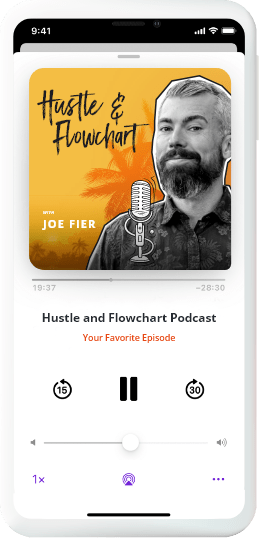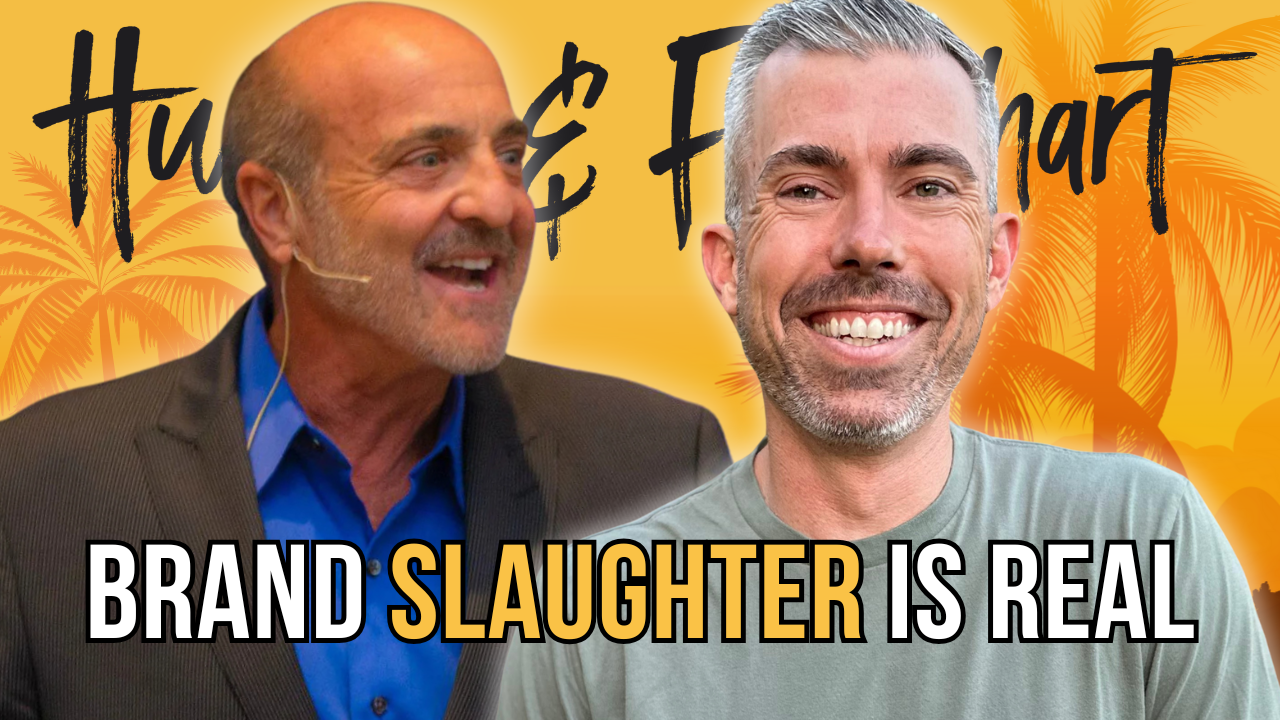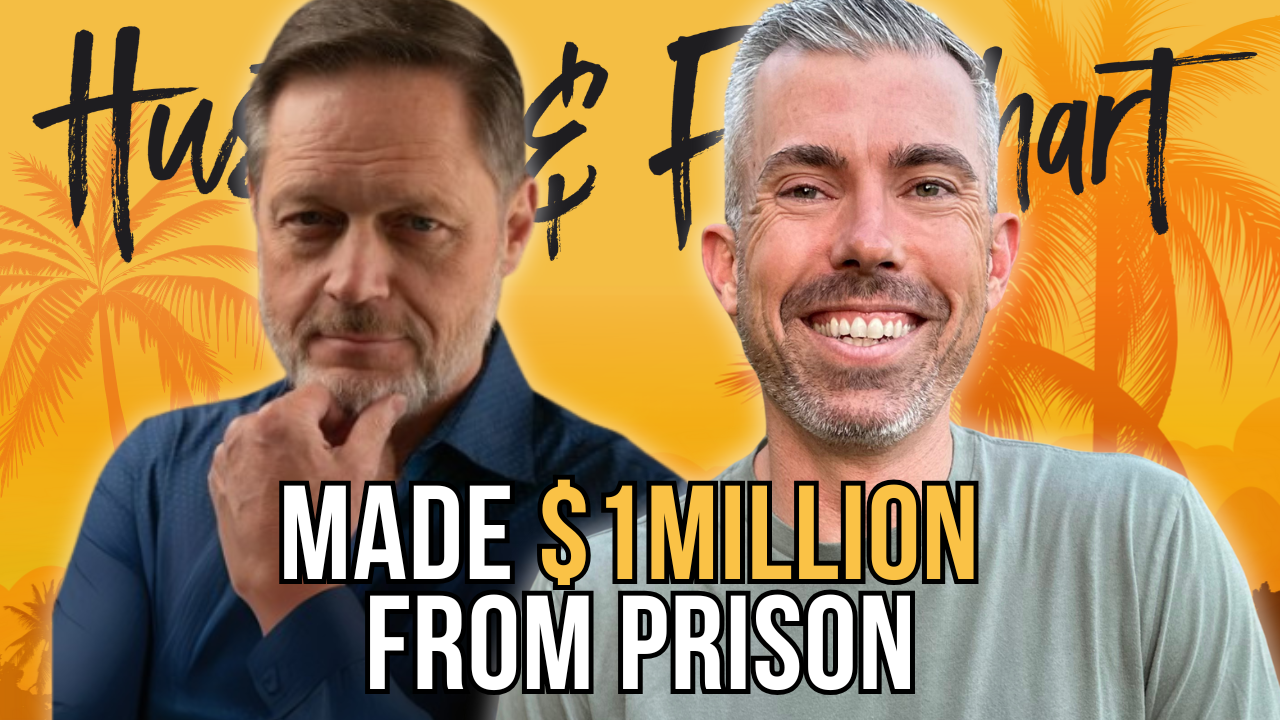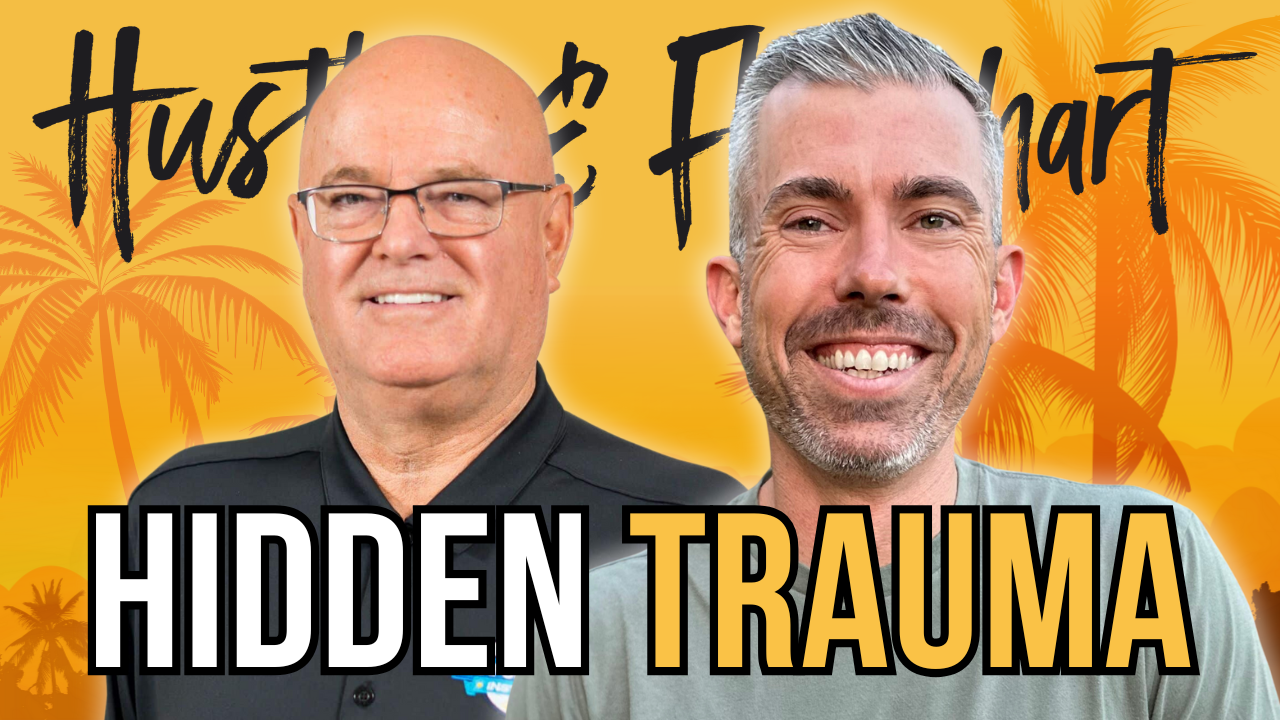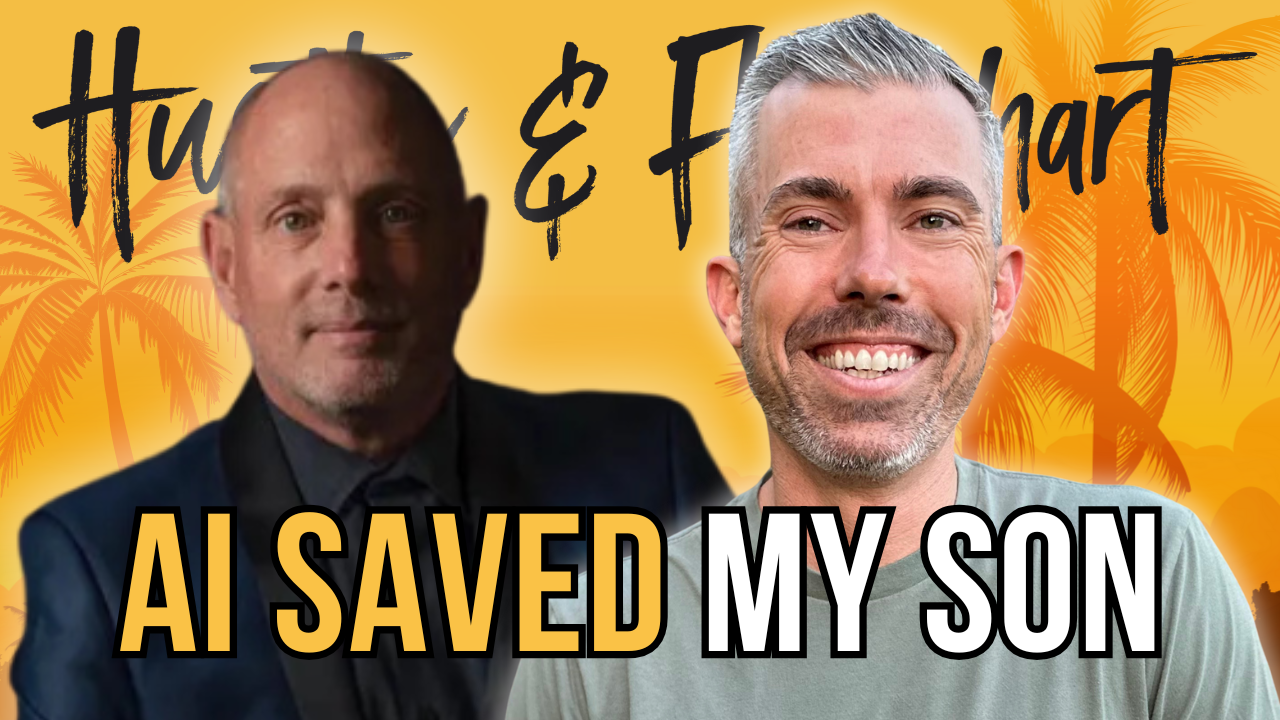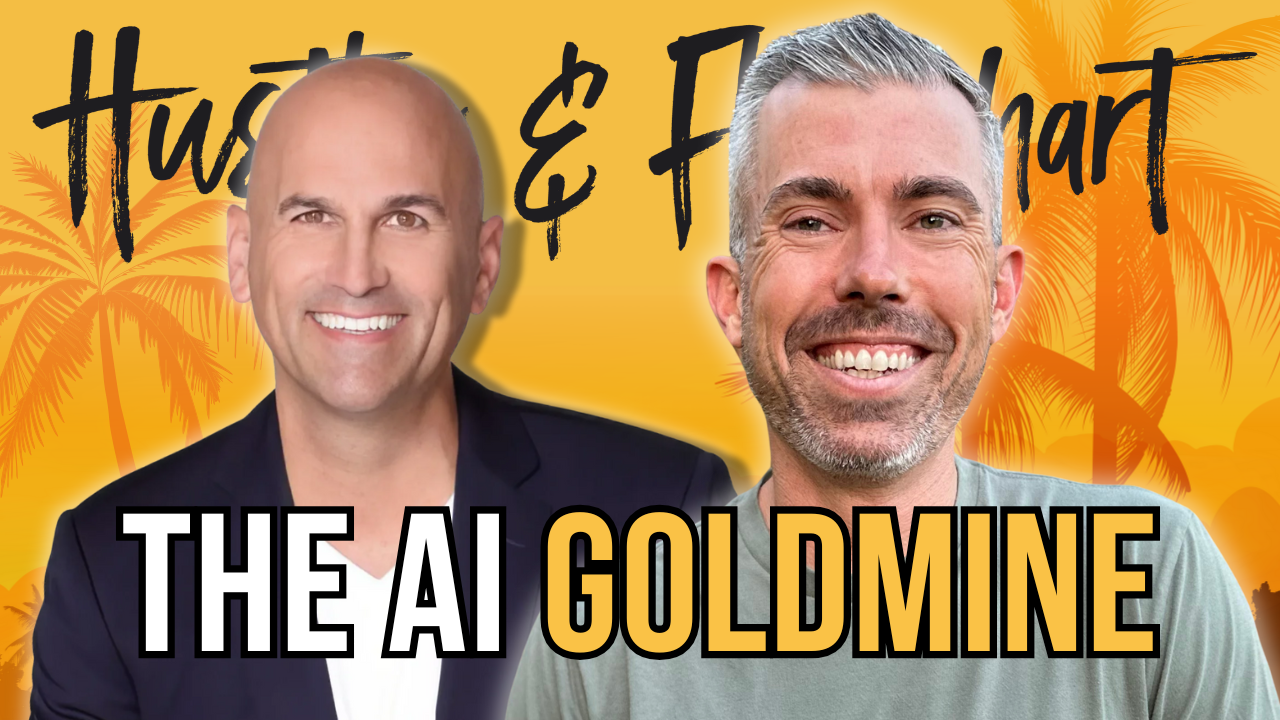When you want to make the biggest impact with the smallest investment, where do you start? That’s what I set out to explore with Justin Abrams, founder and agency owner of Cause of a Kind. On the latest episode of Hustle and Flowchart, Justin joined me for a raw, honest, and energetic discussion on how to increase your chances of “getting lucky,” grow your network, and test your ideas the smart way—so you can build a career or business you actually care about. Justin opened up about balancing a busy family and business life, and why he chooses to follow opportunity more than passion.
Justin and I shared stories about connecting with people, how working with others is different from sitting behind a keyboard, and ways to push past anxiety to get what you want. We also broke down Justin’s idea of the “Minimum Imaginative Product”—a way to test your big ideas without burning money or time. Along the way, we hit on networking, overcoming self-doubt, and supporting other people so everyone can grow.
Table of Contents
ToggleKeeping Life and Business Grounded
Justin balances being a dad, a husband, and an entrepreneur. He explained how these parts of his life keep him focused and healthy. Raising a young son, expecting a daughter, and staying active through sports like climbing, CrossFit, and golf all help him manage stress and stay humble. Justin pointed out that family makes it easy to know what’s important—when you’re busy raising kids, you have to be clear about your time.
Justin said, “There’s nothing more grounding than nesting and welcoming an infant into the world. So I’m very much at home.” He makes time for his hobbies, but he knows his business life matters too. By mixing work, family, and activities, he keeps his energy up and avoids burnout.
Key Takeaways:
- Family life provides real motivation and focus.
- Activities like sports serve both as stress relief and opportunities to reset.
- Keeping a well-rounded routine makes tough days easier.
Why Following Opportunity Matters More Than Passion
People always say, “Follow your passion.” Justin argues the better strategy is to follow opportunity first, and let the passion grow from there. Early in his career, Justin loved rock climbing and even thought about building his professional life around it, but realized he was never going to be a professional in that area. Instead, he found roles—like sales and client services—that matched what he was good at and allowed him to support others. In time, passion grew out of those choices.
Justin shared, “Opportunity is sometimes more important to follow than passion. I’m really lucky to have become passionate about my opportunity that came my way.” Instead of forcing a business into his favorite hobby, he waited for the market to tell him what was needed and grew skilled at meeting that need. That approach gave him real security and allowed him to blend what he cares about with what makes money.
Key Takeaways:
- Opportunities open more doors than chasing passion alone.
- Building skills for what’s needed can eventually build passion.
- Make choices based on what’s possible, not just what feels fun.
Building Networks and Increasing Your “Surface Area for Luck”
Showing up, meeting people, and trying new things automatically multiplies your chances to get lucky—what Justin calls “increasing your surface area for luck.” Justin says stepping out takes practice and sometimes a push, especially if you struggle with anxiety or self-doubt. He encourages young people and established pros: take small chances, whether that’s your first job, a coffee chat, or a networking event.
He explained: “If you stay static, you can guarantee one thing, that momentum is cut off. For anybody that is pursuing opportunity… how can we figure out how to increase our surface area for luck?” Justin’s advice rings true—by accepting invitations, following up with new contacts, and saying yes to things outside your routine, things begin to snowball.
Justin also started the Long Island Technologists group, a grassroots effort to get tech folks together in person every 45 days. Attendees range from business owners to people just starting out, and everyone benefits from this open, giving attitude.
Key Takeaways:
- Luck is something you can grow by meeting new people and trying new things.
- Don’t wait for the perfect condition; showing up is half the ticket.
- Creating spaces for people to connect can multiply everyone’s success.
- “Lucky You” by Price Pritchett is a recommend read, check out here.
Wrestling with Doubt, Anxiety, and Staying Human
Many people think outgoing founders and agency owners have it all figured out, but Justin reminded listeners that anxiety, depression, and doubt always show up. He talked about the tough years, missing opportunities due to low energy or worry, and how everyone has moments of feeling unworthy.
But Justin doesn’t let these struggles win. He explained, “I just have a refusal to just be regular.” Each day, he looks for ways to challenge himself, to get out and make connections—even if it’s hard. He mentioned using sports and hobbies not just for exercise, but as ways to start conversations and build real connections.
Key Takeaways:
- Even successful people feel anxiety and self-doubt.
- Small actions, like conversations at the gym or golf course, can lead to breakthroughs.
- Facing the discomfort beats sitting out and missing opportunities.
The Minimum Imaginative Product: How to Test Your Ideas Before Spending Big
Justin introduced his method for saving time and money when launching new ideas: start with a “Minimum Imaginative Product” (MIP). Unlike a “Minimum Viable Product,” which might still take months and thousands of dollars, the MIP is the earliest possible test—a landing page, a conversation, or a basic survey—to check if anyone else even wants what you are building.
Justin said, “The minimum imaginative product doesn’t have to be like your minimum viable… This has to do with your shower moment, your traffic moment.” He lays out a process, like searching Instagram hashtags or using AI, to see if there’s already a conversation or market for your idea. Are people talking about this problem? Is someone searching for a solution?
If yes, move ahead. If no one seems interested, save your resources for the next thing. Justin stressed using AI tools like ChatGPT or Google Gemini to brainstorm, challenge your idea, or even try to break it before moving forward.
Key Takeaways:
- Start testing an idea before making a big investment.
- Use free digital tools and platforms for early idea validation.
- AI can quickly help you check if an idea already exists or if people care about it.
- Save time and money by failing early—“fail wisely.”
- AI Tools Mentioned: ChatGPT, Google Gemini, Grok by X.
Giving, Connecting, and Building Community
Giving first and connecting people together formed a central part of Justin’s philosophy. Rather than push for the sale, he asks, “How can I help this person today? How can I make them remember me?” Whether it’s sharing a business tip, making a useful introduction, or just being a genuine voice, this approach naturally leads to new deals and partnerships.
Justin explained, “My whole goal is to give value. I give, give, give. Like, I never ask for the order… A customer has to ask me for the paperwork.” Over time, this leads to trust-based relationships, where the referrals and collaborations come back many times over. Sharing openly, through events like Long Island Technologists, supports everyone and attracts the kind of opportunities that matter.
Key Takeaways:
- Give first, ask later—real value creates trust.
- Connect people even if there is no direct benefit in sight.
- Community leaders get more opportunities simply by bringing others together.
- Building trust leads to better business and stronger friendships.
Looking Forward: Family, Impact, and Growth
Justin wrapped up talking about what he’s most excited about: the arrival of his daughter, growing his agency, and driving more impact for others. He explained how each child marks a measurement of time, and he tracks business success alongside those milestones.
Justin’s purpose has become clear in two words: “drive impact.” Looking forward, he aims to compound what’s working, deepen his community roots, and keep pushing himself to be present—as a dad, business owner, and community leader. Like he said: “I believe that we are chronicling with our podcast the journey of our life.”
Key Takeaways:
- Measure success not just by revenue, but by impact on others.
- Growth comes from steady action and focusing on what matters most.
- Stay open to learning from everyone, and celebrate small and big wins alike.
Connect with Justin Abrams:
- Cause of a Kind – Justin’s agency
- Strictly from Nowhere – Justin's Podcast
- Long Island Technologists – Tech networking group
Useful Resources
- Lucky You by Price Pritchett – Book on multiplying luck
Two Other Episodes You Should Check Out
Connect with Joe Fier
- What if you could have a FREE personal mentor on-demand?! With Joe's Hustle & Flowchart AI clone, you can tap into the knowledge from over 600 episodes any time! Whether you need advice on scaling, marketing, or productivity, my AI clone is here to help.
- Want us to build your clone for you? We’ll handle setup, testing, and integration so you can launch fast. Head to HustleandFlowchart.com/interest to get started!
- Hubspot has launched a whole new suite of AI Tools, check them on the Hubspot.com
- Check out other podcasts on the HubSpot Podcast Network
- We want to hear from you. Send us the One Thing you want to hear on the show.
- Connect with Joe on LinkedIn and Instagram
- Subscribe to the YouTube Channel
- Contact Joe: joe@hustleandflowchart.com
Thanks for tuning into this episode of the Hustle & Flowchart Podcast!
If the information in these conversations and interviews have helped you in your business journey, please head over to iTunes (or wherever you listen), subscribe to the show, and leave me an honest review.
Your reviews and feedback will not only help me continue to deliver great, helpful content, but it will also help me reach even more amazing entrepreneurs just like you!







